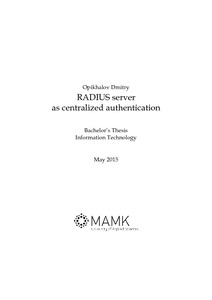RADIUS server as centralized authentication
Opikhalov, Dmitry (2015)
Opikhalov, Dmitry
Mikkelin ammattikorkeakoulu
2015
All rights reserved
Julkaisun pysyvä osoite on
https://urn.fi/URN:NBN:fi:amk-2015060211804
https://urn.fi/URN:NBN:fi:amk-2015060211804
Tiivistelmä
The purpose of this thesis was to examine the field of authentication and authorization for wireless users connected to Central Authentication Server. The topic has gained certain popularity over the last decade because of the constant growth of wireless users. Knowing the basics of this particular topic field that the topic will prepare myself for the future work placement.
The thesis defines AAA protocols and protocol’s idea, authentication protocols and security standards. The practice explains by steps the implementation in to the private network of the RADIUS protocol that was chosen as an AAA protocol. DHCP, DNS, SQL servers’ and Active Directory’s basic ideas were discussed and put into practice. Also some additional topics that are under very heavy development were touched during the study like virtualization.
As the result the private network was created, where RADIUS server authenticates wirelessly connected users. The accounting has helped to gather the outcome of how RADIUS behaves and which decisions were made for the specific user. However, this thesis can be used as a background for future more advanced development or lab needs.
The thesis defines AAA protocols and protocol’s idea, authentication protocols and security standards. The practice explains by steps the implementation in to the private network of the RADIUS protocol that was chosen as an AAA protocol. DHCP, DNS, SQL servers’ and Active Directory’s basic ideas were discussed and put into practice. Also some additional topics that are under very heavy development were touched during the study like virtualization.
As the result the private network was created, where RADIUS server authenticates wirelessly connected users. The accounting has helped to gather the outcome of how RADIUS behaves and which decisions were made for the specific user. However, this thesis can be used as a background for future more advanced development or lab needs.
